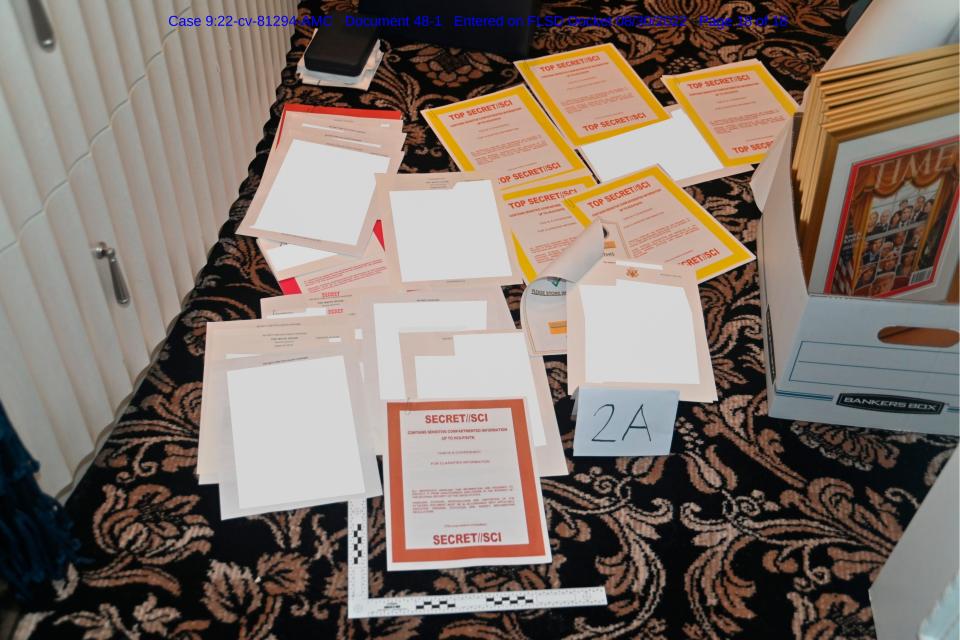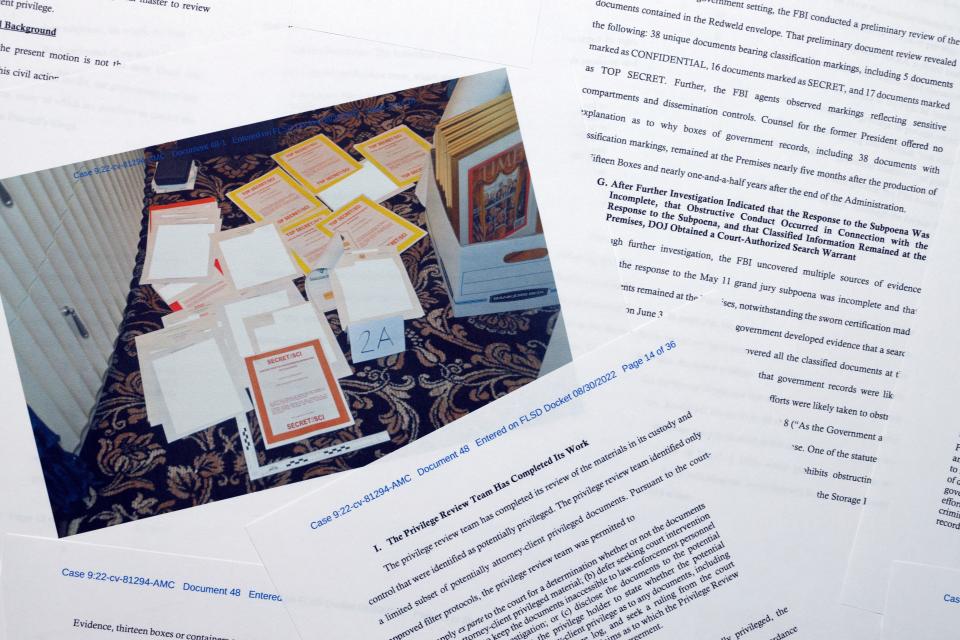Appeals court grants DOJ investigative access to classified documents seized from Trump's Mar-a-Lago
WASHINGTON – A federal appeals court overturned a prohibition against the Justice Department investigating classified documents seized at Donald Trump's Florida estate, allowing Department of Justice officials to resume reviewing the records for possible criminal charges.
The three-judge panel of the 11th U.S. Circuit Court of Appeals said it could find no personal interest for Trump in documents marked classified and no evidence in the record that he had declassified them as president, as he has suggested on social media.
"In any event, at least for these purposes, the declassification argument is a red herring because declassifying an official document would not change its content or render it personal," the panel wrote.

U.S. District Judge Aileen Cannon temporarily prohibited federal authorities from scrutinizing 11,000 documents while a special master reviews the records for potential personal papers or those falling under attorney-client privilege.
The Justice Department appealed part of her decision by arguing investigators needed to continue reviewing about 100 classified documents seized at Mar-a-Lago.
Appeals Judges Robin Rosenbaum, Britt Grant and Andrew Brasher ruled Wednesday the government was entitled to a halt in Cannon's restrictions while the case is argued. The judges stressed that they were not ruling on the merits of the case, just Cannon's temporary prohibition while a special master reviews the documents.
"The United States argues that the district court likely erred in exercising its jurisdiction to enjoin the United States’s use of the classified records in its criminal investigation and to require the United States to submit the marked classified documents to a special master for review," the judges wrote. "We agree."
Grant and Brasher were appointed by Trump, as was Cannon.
Andrew Weissmann, a former federal prosecutor who worked on special counsel Robert Mueller's investigation of Russian interference in the 2016 election, lauded the ruling by tweeting that the "rule of law is back."
"11th Circuit makes Cannon fodder," Weissmann posted, playing off the judge's name.

The three-judge panel said it could not fathom why Trump might have a claim to the documents in dispute.
“We cannot discern why Plaintiff would have an individual interest in or need for any of the one-hundred documents with classification markings,” the court concluded. “Classified documents are marked to show they are classified… For this reason, a person may have access to classified information only if, among other requirements, he ‘has a need-to-know the information.’
“Plaintiff has not even attempted to show that he has a need to know the information contained in the classified documents," the judges added. "Nor has he established that the current administration has waived that requirement for these documents.”
More: Biden says he doesn't know what national secrets are contained in Mar-a-Lago documents
The judges noted that Trump suggests he declassified the documents as president, but the record contains no evidence they were declassified.
Trump: president can declassify docs just by 'thinking about it'
Speaking on Fox News' Hannity show Wednesday, host Sean Hannity asked Trump what his process to declassify documents was.
"There doesn't have to be a process as I understand it," the former president told Hannity. "You're the president of the United States. You can declassify just by saying 'it's declassified,' even by thinking about it because you're sending it to Mar-a-Lago or to wherever you're sending it. And there doesn't have to be a process. That can be a process but there doesn't have to be. You're the president. You make that decision."
How documents are declassified: These graphics show who can classify – and declassify – documents, sensitive information
In a hearing Tuesday before the special master, U.S. District Judge Raymond Dearie, Trump's lawyers provided no evidence he declassified any of the documents.
The appeals panel said it could not conclude that Trump would be “irreparably injured” by the stay.
More: 'Astounding': Trump documents reveal casual disregard for long-standing security protocols
Trump’s attorneys, the court concluded, had not asserted “attorney-client privilege over any of the classified documents.”
The court found that it was not enough that Trump faced “potential injury” through future prosecution related to the mishandling of the documents.
“No doubt the threat of prosecution can weigh heavily on the mind of someone under investigation," the panel wrote. "But without diminishing the seriousness of that burden,” the court found that any potential defendant could make such an argument.

Contributing: Ledyard King
This article originally appeared on USA TODAY: Appeals court gives DOJ access to classified documents from Mar-a-Lago
